
Wake Up!
Boston Camarata: Jesus, the Light of the World

Boston Camarata: Jesus, the Light of the World
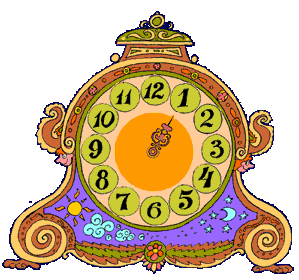
|


4 You are my King, O God;
5 Through You we will push down our enemies;
Through Your name we will trample those who rise up against us.
6 For I will not trust in my bow,
Nor shall my sword save me.
7 But You have saved us from our enemies,
And have put to shame those who hated us.
8 In God we boast all day long,
And praise Your name forever. Selah

9 But You have cast us off and put us to shame,
And You do not go out with our armies.
10 You make us turn back from the enemy,
And those who hate us have taken spoil for themselves.
11 You have given us up like sheep intended food,
And have scattered us among the nations.

12 You sell Your people for next to nothing,
And are not enriched by selling them.
13 You make us a reproach to our neighbors,
A scorn and a derision to those all around us.
14 You make us a byword among the nations,
A shaking of the head among the peoples.

15 My dishonor is continually before me,
And the shame of my face has covered me,
16 Because of the voice of him who reproaches and reviles,
Because of the enemy and the avenger.
17 All this has come upon us;
But we have not forgotten You,
Nor have we dealt falsely with Your covenant.
18 Our heart has not turned back,
Nor have our steps departed from Your way;
19 But You have severely broken us in the place of jackals,
And covered us with the shadow of death.

20 If we had forgotten the name of our God,
Or stretched out our hands to a foreign god,
21 Would not God search this out?
For He knows the secrets of the heart.
22 Yet for Your sake we are killed all day long;
We are accounted as sheep for the slaughter.
Awake! Why do You sleep, O Lord?
Arise! Do not cast us off forever.
24 Why do You hide Your face,
And forget our affliction and our oppression?
25 For our soul is bowed down to the dust;
Our body clings to the ground.

26 Arise for our help,
And redeem us for Your mercies’ sake.

Speaking for the nation, the psalmist related the account of God giving the Promised Land to His people in Joshua’s days that the forefathers had told. He stressed that God had given Canaan to them by defeating their enemies. The Israelites did not win it by their own strength. Next to the Exodus, the most frequently mentioned period of Israel’s history in the Psalm is the conquest of the land.
1. The reason for Israel's present trust in the Lord 44:1-8. The psalmist recalled God"s past faithfulness to Israel"s forefathers and affirmed the nation"s present confidence in the Lord. The writer spoke for the nation of Israel in this psalm. He lamented a national disaster, namely, defeat by enemies, and he called on the Lord to deliver. Evidently he could not identify sin in the nation as the cause of this defeat. He attributed it instead to it being "for Your sake" ( Psalm 44:22). Israel was apparently suffering because she had remained loyal to God in a world hostile to Him. The basis of the psalmist"s request was God"s faithfulness to the patriarchs and the people"s present trust in Him. [Note: On the meaning of Maskil in the title, see my note on Psalm 32.] Perhaps the Psalter"s boldest appeal to God"s faithfulness is found in Psalm 44, a communal lament psalm offered to God during an unidentified national catastrophe." Perhaps this psalm was used at a national "day of prayer" with a worship leader speaking the "I/my" verses and the people the "we/our" verses." [Note: Wiersbe, The . . . Wisdom . . ., p177. Israel needed God"s help again in her present conflicts with enemy nations. On the basis of parallels between this psalm and Psalm 60, Wiersbe suggested that the enemies in view may have been the Edomites and the Arameans (cf. Psalm 44:3 and Psalm 60:5; Psalm 44:5 and Psalm 60:12; Psalm 44:9; Psalm 44:23 and Psalm 60:1; Psalm 60:10). [Note: Wiersbe, The . . . Wisdom . . ., p177.] The writer led the nation in looking to Yahweh as her King and military commander (cf. Joshua 5:13-15). He not only affirmed his confidence in God but also renounced reliance on military armaments. He intended his statement that the nation had boasted in the Lord and would thank Him forever ( Psalm 44:8) to move God to save His people again. Only when the Israelites had put aside their confidence in weaponry and bravery could they become instruments in the hands of God." [Note: VanGemeren, p339.] God had allowed His people to suffer defeat recently for some reason. The nation had retreated and the enemy had taken spoils.2. Israel's present defeated condition 44:9-1. These verses describe the defeat figuratively. God had not protected His sheep but had allowed their enemy to ravage them. He had sold them to the enemy but had not profited from the bargain personally. Israel's defeat had made her an object of ridicule among her neighbor nations. They laughed at God"s people because the Lord had not defended them.The psalmist's heart broke because Israel suffered such humiliation. He suffered because God"s reputation suffered too. Even though the Lord had abandoned His people temporarily, the psalmist claimed that the nation continued to trust and obey Him. They had continued to remember Him, and they had not forsaken allegiance to the Mosaic Covenant. They had done so in the face of their disastrous defeat.
3. The nation's continuing trust in the Lord 44:17-22:
Their defeat and humiliation were not the consequences of apostasy. They suffered innocently for some unknown reason. It seemed as though God allowed Israel"s enemy to slaughter some of His sheep for purposes known only to Him. The Apostle Paul quoted Psalm 44:22 in Romans 8:36 as proof that even though God"s people suffer, God does not forsake them. 4. A prayer requesting divine intervention 44:23-26 The psalmist cried out to God to act for His people. He pictured God as asleep and in need of arousing (cf. Mark 4:38). Yahweh could not be angry because His people had not sinned by turning to another god ( Psalm 44:18; Psalm 44:20). Israel had come to the end of her rope and was almost dead. Since Yahweh had pledged to protect His people, the writer concluded with an appeal to His loyal love. Sometimes believers suffer through no apparent fault of their own. In such situations we should maintain our trust and obedience, and we should call on God to deliver us as He has promised to do. Even if He allows us to perish in this life, we should still remain faithful to Him (cf. Job 13:15).![]()

A wonderful pastor friend of mine, Andy Burnham, wrote me recently (3/23/21) as follows.
Hi Lambert,
Thanks for the encouraging words. It's been a bit strange not writing a devotional every day.
However, Rick Thrasher is pulling them together into a book, so I'm doing a few things connected with that.
Also, I'm thinking about writing something along the lines of "Body Life." I might call it "Back to Basics."
In many ways,
I feel like the church today is like a soldier
wandering the battlefield in shell--shock,
dazed, confused, disoriented, and in disarray.
P.S. I like the cartoon!
Andy,
Jim Hutchinson from Alberta, Canada chimed in:
I was about to reply to Lambert when you did.
I'm thankful that the Holy Spirit is stirring up His passion within you. Yes, yes...just as that soldier you describe, is the church. Watchman have a special task - the Lord has them see things others don't. But being a watchman is a lonely job with great reward - for many, many are rescued by the Watchman's cry. So, clarion the call my friend. Don't leave the poor vacuum destitute, all alone.
Eternity, Jesus infuses within our soul, pulls on us with passion we cannot understand nor resist. So great is the vacuum, when we only are the ones for His moment - a world in need of salt. He shows us Himself in ways others cannot see, yet. That life He gives, through our fingers as ink quill before, communicates the communion that is possible, rendering His peace beyond this world. --Jim.
Earlier the same day I wrote Andy as follows:
I am usually wide awake and answering email by 2 or 3 AM.
There is a big void now, a vacuum, where I used to read and be energized by your 6 AM daily devotions —-sent to your wonderful Mailing List of special hungry persons in need of a decent breakfast. Our Daily Bread is not very filling frankly. Writing an article every day is hard work even for a “retired” person, but why not cut and paste a Psalm a day or a few Proverbs?
Or delegate a jobless person from Step Closer or Our Brothers House to take this project on?
You are greatly missed and what you wrote every time had very low entropy.
Never mind if your earthly readers don’t often respond. The New Jerusalem Gazette reads what you write (I suspect) and that would include “Innumerable angels.” There are grand archives in heaven!
Lambert

What I have noticed in my own life is the ease with which I can end up reading cheap literature, watching ho-hum television or listening to low-grade music. On the other hand, I am invariably inspired and edified when I choose to listen to someone like Johann Sebastian Bach. He wrote everything to the glory of God (Sole Deo Gloria)--and this can not be hidden.
I enjoy listening to the collected organ works of Bach played by the great French organist Marie Claire Alain. I was amazed this week to learn something new from her notes on BWV 552, the great Fugue in E flat major. Listen to this Fugue in mp3 format (http://ldolphin.org/audio/bwv552.mp3)
Ms. Alain says,
"Written for organo pleno, this marvel of religious architecture brings the collection to a close. Unsurprisingly, perhaps, the fugue comprises three sections devoted to the three Persons of the Trinity. The key-signature is E flat, i.e., three flats. And the time-signatures progress from compound time (2/4) to 6/4 and thence to 12/8. The main theme itself (B flat + G + C + B flat + E flat + D) represents Bach's signature. (In German notation, the opening notes of the theme are written B + G + C + B + ES + D = 2 + 7 + 3 + 2 + 18 + 4 = 41 = J. S. Bach).
The opening panel of the triptych, describing the majesty of God the Father, is 36 bars long: 3 + 6 = 9 = 3 x 3 = Exaltation of the Trinity. There are 12 entries of the subject A, representing the Twelve Apostles and hence the Church. In the second panel, which describes Christ's humanity, there are 21 entries of subject B (21 = the number of chorales in the collection, in addition to being a multiple of 3). Subject A is superimposed on it 6 times (6 = 3 x 2, symbolizing completion, as in the six days of the Creation). This second section comprises 45 bars (45 = 4 + 5 = 9).
The third panel describes the motivity of the Holy Ghost in a sacred dance. Like the opening section, it is 36 bars long. Subject C enters 21 times, while subject A enters 9 times. The main theme therefore appears 27 times in the course of the fugue, which is the same number as that of pieces contained in the collection as a whole.
It is an astonishing edifice, a prodigious achievement on the part of a composer familiar with subtlety of musical style, from counterpoint to numerology. But, more than that, it offers a fascinating glimpse of Bach in a moment of deep exultation. Often sad and racked by suffering, he stands here bathed in heavenly light as he turns his thoughts from meditation(Fugue I) to active endeavor (Fugue II) and, finally, to transcendent joy (Fugue III)." (The collection is by Erato Records)
For many years I have been hoping some Christian musician would undertake to teach the rest of us a class on the great hymns of the faith. The composer, the setting, the words and the music of many hymns are a great, inspiring part of the heritage of the church of Jesus Christ. In our day these great old hymns are all but forgotten. This is surely yet one more serious disconnect on our part, from the historical past of our Christian faith. The community we are actually connected to is not merely one generation deep, but has been under development for two millennia. God is not the God of the dead but of the living. We are connected to the saints of all the ages with whom we will soon be gathered. I hope we can live up to the standards many of our predecessors considered everyday holy Christian living.
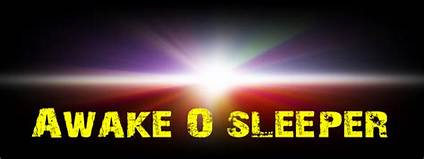
A very beautiful Cantata by Johnann Sebastian Bach anticipated the return of Jesus Christ for His Bride, the church two hundred eighty eight years ago. Actually the disciples of Jesus Christ (soon to be Apostles) had hoped Jesus would return nineteen hundred eight six years ago.
The expectation that Jesus will return soon, called “The Blessed Hope of the Church” has encouraged generations of followers throughout their life times. Because of the intersection of time and eternity at the time of our death, no one waits long to see Jesus when they die. This is true whether that person knows Jesus or not! Of course different destinies for the two groups of persons are in view.
For the grace of God that brings salvation has appeared to all men, teaching us that, denying ungodliness and worldly lusts, we should live soberly, righteously, and godly in the present age, looking for the blessed hope and glorious appearing (epiphaneia) of our great God and Savior Jesus Christ, who gave Himself for us, that He might redeem us from every lawless deed and purify for Himself His own special people, zealous for good works. (Titus 2:11-14)
A Lutheran Hymn dating to 1599
Wachet auf, ruft uns die Stimme ('Awake, calls the voice to us'), BWV 140, also known as Sleepers Wake, is a church cantata by Johann Sebastian Bach, regarded as one of his most mature and popular sacred cantatas. He composed the chorale cantata in Leipzig for the 27th Sunday after Trinity and first performed it on 25 November 1731. (Wikipedia)
“Let this mind be in you which was also in Christ Jesus, who, being in the form of God, did not consider it robbery to be equal with God, but made Himself of no reputation, taking the form of a bondservant, and coming in the likeness of men. And being found in appearance as a man, He humbled Himself and became obedient to the point of death, even the death of the cross. Therefore God also has highly exalted Him and given Him the name which is above every name, that at the name of Jesus every knee should bow, of those in heaven, and of those on earth, and of those under the earth, and that every tongue should confess that Jesus Christ is Lord, to the glory of God the Father.” (Philippians 2:5-11)
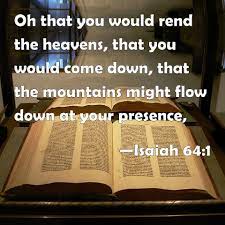
German and English Translation
| 1. Choral Wachet auf, ruft uns die Stimme, der Wächter sehr hoch auf der Zinne, wach auf, du Stadt Jerusalem. Mitternacht heißt diese Stunde, sie rufen uns mit hellem Munde, wo seid ihr klugen Jungfrauen? Wohlauf, der Bräut’gam kömmt, steht auf, die Lampen nehmt, Alleluia! Macht euch bereit zu der Hochzeit, ihr müsset ihm entgegen gehn. (" Wachet auf, ruft uns die Stimme," verse 1) |
1. Chorus Awake, calls the voice to us of the watchmen high up in the tower; awake, you city of Jerusalem. Midnight the hour is named; they call to us with bright voices; where are you, wise virgins? Indeed, the Bridegroom comes; rise up and take your lamps, Alleluia! Make yourselves ready for the wedding, you must go to meet Him. |
| 2. Rezitativ T Er kommt, er kommt, der Bräut’gam kommt, ihr Töchter Zions, kommt heraus, Sein Ausgang eilet aus der Höhe in euer Mutter Haus. Der Bräut’gam kommt, der einen Rehe und jungen Hirschen gleich auf denen Hügeln springt und euch das Mahl der Hochzeit bringt. Wacht auf, ermuntert euch, den Bräut’gam zu empfangen; dort, sehet, kommt er hergegangen. |
2. Recitative T He comes, He comes, the Bridegroom comes, O Zion's daughters, come out, his course runs from the heights into your mother's house. The Bridegroom comes, who like a roe and young stag leaps upon the hills; to you He brings the wedding feast. Rise up, take heart, to embrace the bridegroom; there, look, He comes this way. |
| 3. Arie- Duett S B (Dialog - Seele, Jesus) Wenn kömmst du, mein Heil? - Ich komme, dein Teil. - Ich warte mit brennenden Öle. Eröffne den Saal - Ich öffne den Saal - zum himmlischen Mahl. Komm, Jesu. - Ich komme, komm, liebliche Seele. - |
3. Aria - Duet S B (Dialogue - Soul, Jesus) When will You come, my Savior? - I come, as Your portion. - I wait with burning oil. Now open the hall - I open the hall - for the heavenly meal. Come, Jesus! - I come, come, lovely soul! - |
| 4. Choral T Zion hört die Wächter singen, das Herz tut ihr vor Freuden springen, sie wachet und steht eilend auf. Ihr Freund kommt von Himmel prächtig, von Gnaden stark, von Wahrheit mächtig, ihr Licht wird hell, ihr Stern geht auf. Nun komm, du werte Kron’, Herr Jesu, Gottes Sohn, Hosianna! Wir folgen all zum Freudensaal und halten mit das Abendmahl. (" Wachet auf, ruft uns die Stimme," verse 2) |
4. Chorale T Zion hears the watchmen sing, her heart leaps for joy within her, she wakens and hastily arises. Her glorious Friend comes from heaven, strong in mercy, powerful in truth, her light becomes bright, her star rises. Now come, precious crown, Lord Jesus, the Son of God! Hosannah! We all follow to the hall of joy and hold the evening meal together. |
| 5. Rezitativ B So geh herein zu mir, du mir erwählte Braut! Ich habe mich mit dir von Ewigkeit vertraut. Dich will ich auf mein Herz, auf meinen Arm gleich wie ein Sigel setzen, und dein betrübtes Aug’ ergötzen. Vergiß, o Seele, nun die Angst, den Schmerz, den du erdulden müssen; auf meiner Linken sollst du ruhn, und meine Rechte soll dich küssen. |
5. Recitative B So come in to Me, you My chosen bride! I have to you eternally betrothed Myself. I will set you upon My heart, upon My arm as a seal, and delight your troubled eye. Forget, O soul, now the fear, the pain which you have had to suffer; upon My left hand you shall rest, and My right hand shall kiss you. |
6. Arie - Duett S B (Dialog - Seele, Jesus) |
6. Aria - Duet S B (Dialogue - Soul, Jesus) My Friend is mine, - and I am yours, - love will never part us. I will with You - you will with Me - graze among heaven’s roses, where complete pleasure and delight will be. |
7. Choral ("Wachet auf, ruft uns die Stimme," verse 3) |
7. Chorale Let Gloria be sung to You with mortal and angelic tongues, with harps and even with cymbals. Of twelve pearls the portals are made, In Your city we are companions Of the angels high around Your throne. No eye has ever perceived, no ear has ever heard such joy as our happiness, Io, io, |
|
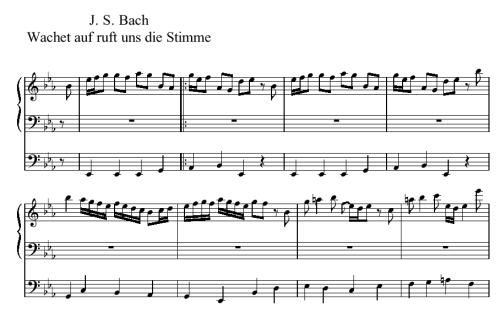
https://en.m.wikipedia.org/wiki/Wachet_auf,_ruft_uns_die_Stimme,_BWV_140
http://www.emmanuelmusic.org/notes_translations/translations_cantata/t_bwv140.htm
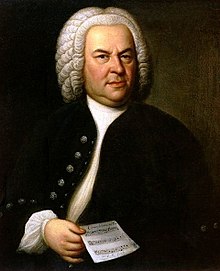
Organ performance by Matthias Havinga
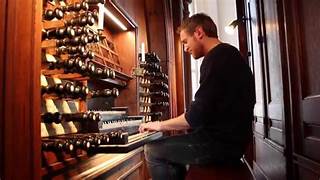
| A. W. Tozer says, "The cross is the symbol of death. It stands for the abrupt, violent end of the human being. The man in Roman times who took up his cross and started down the road had already said goodbye to his friends. He was not coming back. He was not going out to have his life redirected. He was going out to have it ended. The cross made no compromise, modified nothing, spared nothing. It slew all of the man completely and for good. It did not try to keep on good terms with its victim. It struck swift and hard and when it had finished its work the man was no more. That evangelism which draws friendly parallels between the ways of God and the ways of man is false to the Bible and cruel to the soul of the hearers. The faith of Christ does not parallel the world. It intersects it. In coming to Christ we do not bring our life up on to a higher plane. We leave it at a cross. The grain of wheat must fall into the ground and die. That is the beginning of the gospel." |
![]()

The Scottish poet laureate Robert Burns,
said he was seeking the ability of seeing himself as others saw him.
Notes by Lambert Dolphin

Email Lambert
Lambert Dolphin's Place (Home Page)
Lambert Dolphin's Original Web Site (1995)
Lambert's Personal Testimony
Newsletters by Lambert
800+ Recent Articles (since 2018) Free
| The Temple Mount in Jerusalem: (http://templemount.org)
For more information on the Temple Mount in Jerusalem, research concerning the location of the First and Second Temples and recent developments there see our separate web site. Maps and history of Jerusalem are brought up to date with MP3 lectures by leading scholars and research papers concerning the location of the Jewish Temples and plans for a Third Temple. Developed with the help of Mike Kollen, Jim Milligan and Norma Robertson. |
 |

March 23, 2021. December 25, 2022. June 11, 2023. July 7, 2023